Analysis of Behaviourism Learning Theories within the Nursing Field
VerifiedAdded on 2020/07/23
|9
|2465
|745
Report
AI Summary
This report provides a comprehensive overview of behaviourism learning theories and their significant applications within the nursing field. It begins by defining behaviourism as a psychological movement and explores its historical context, emphasizing its focus on observable behaviors rather than internal mental processes. The report delves into different branches of behaviourism, including methodological, radical, teleological, theoretical, and biological behaviourism, highlighting their core principles and methodologies. It further discusses the contributions of educational psychologists like Watson, Pavlov, and Skinner, particularly focusing on classical and operant conditioning. The analysis examines the positive impacts of behaviourism in nursing, such as its role in modifying patient behaviors, improving training methods, and enhancing overall healthcare outcomes. Criticisms of the approach are also addressed. The report concludes by summarizing the core assumptions of behaviourism and its relevance to healthcare professionals in understanding and addressing various psychological and medical situations. The report highlights how nurses can leverage behavioural theories to assess and improve patient care, emphasizing the importance of continuous learning and adaptation in the field. The provided references are books and journals.
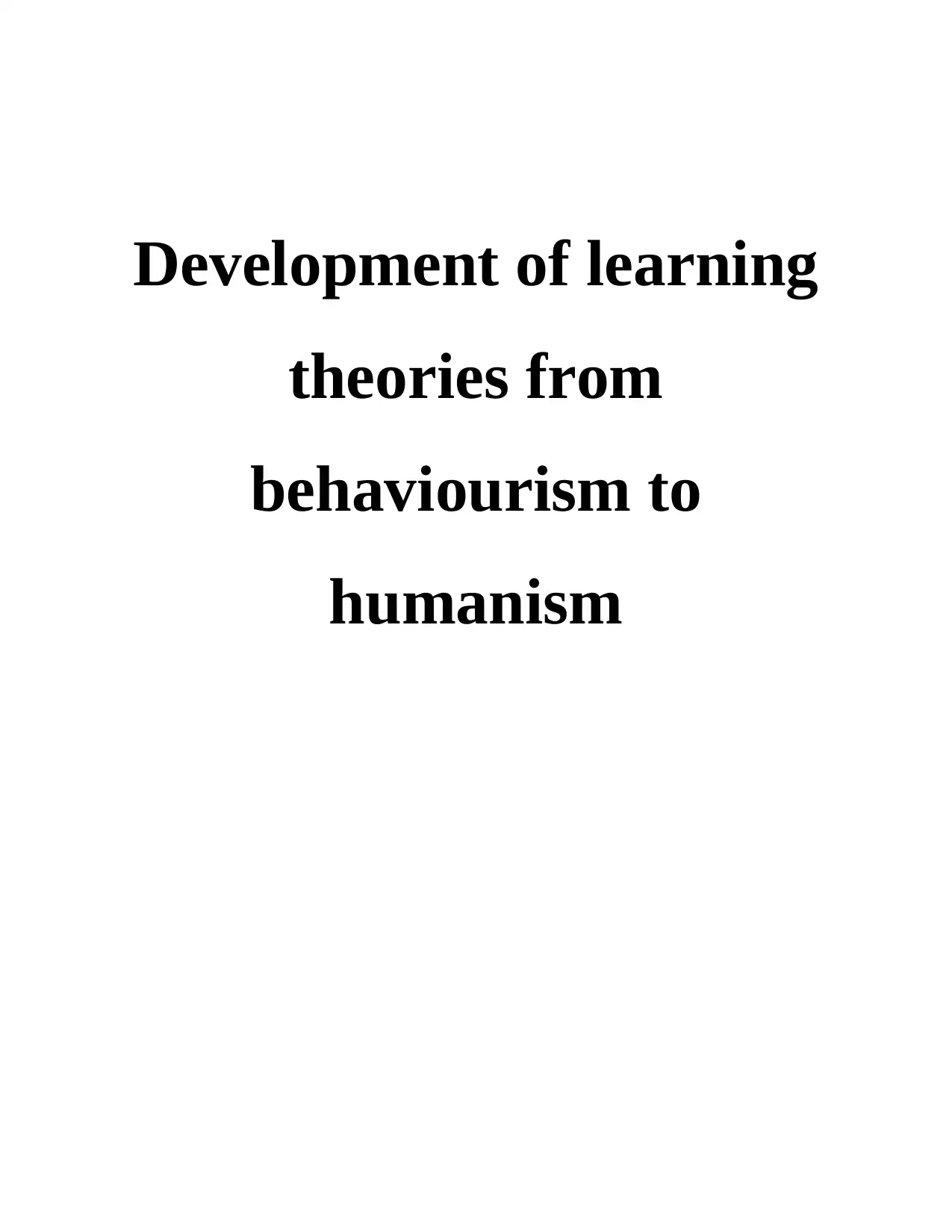
Development of learning
theories from
behaviourism to
humanism
theories from
behaviourism to
humanism
Paraphrase This Document
Need a fresh take? Get an instant paraphrase of this document with our AI Paraphraser
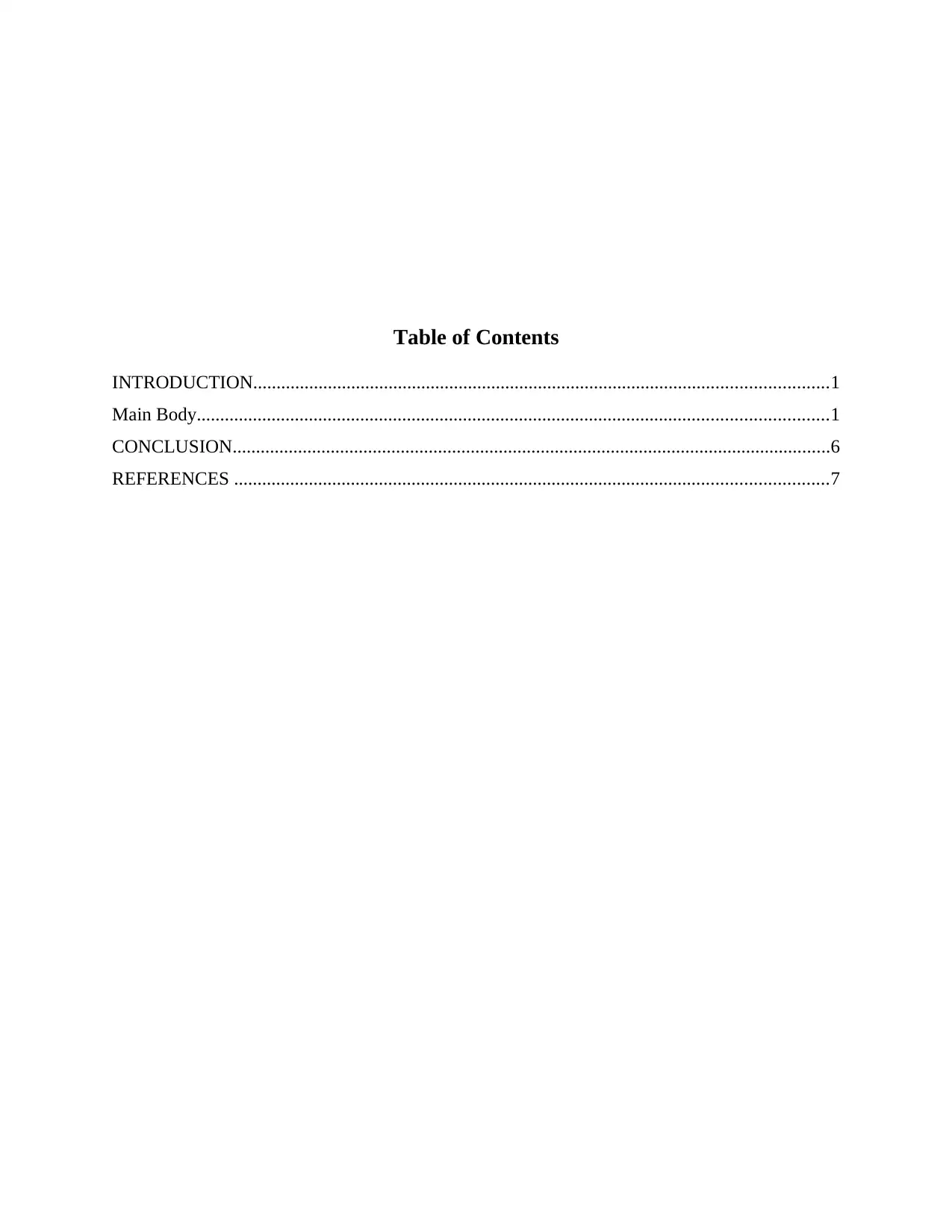
Table of Contents
INTRODUCTION...........................................................................................................................1
Main Body.......................................................................................................................................1
CONCLUSION................................................................................................................................6
REFERENCES ...............................................................................................................................7
INTRODUCTION...........................................................................................................................1
Main Body.......................................................................................................................................1
CONCLUSION................................................................................................................................6
REFERENCES ...............................................................................................................................7
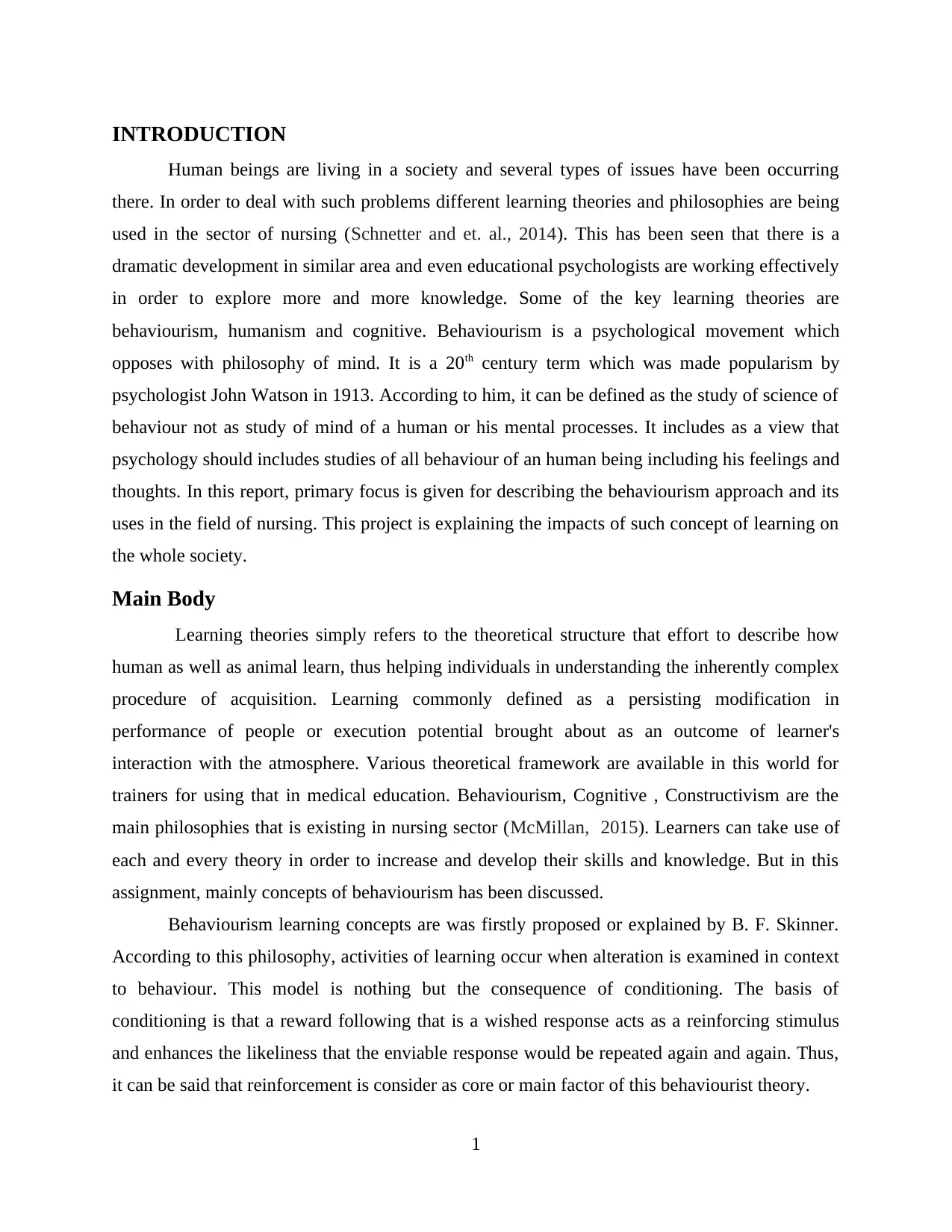
INTRODUCTION
Human beings are living in a society and several types of issues have been occurring
there. In order to deal with such problems different learning theories and philosophies are being
used in the sector of nursing (Schnetter and et. al., 2014). This has been seen that there is a
dramatic development in similar area and even educational psychologists are working effectively
in order to explore more and more knowledge. Some of the key learning theories are
behaviourism, humanism and cognitive. Behaviourism is a psychological movement which
opposes with philosophy of mind. It is a 20th century term which was made popularism by
psychologist John Watson in 1913. According to him, it can be defined as the study of science of
behaviour not as study of mind of a human or his mental processes. It includes as a view that
psychology should includes studies of all behaviour of an human being including his feelings and
thoughts. In this report, primary focus is given for describing the behaviourism approach and its
uses in the field of nursing. This project is explaining the impacts of such concept of learning on
the whole society.
Main Body
Learning theories simply refers to the theoretical structure that effort to describe how
human as well as animal learn, thus helping individuals in understanding the inherently complex
procedure of acquisition. Learning commonly defined as a persisting modification in
performance of people or execution potential brought about as an outcome of learner's
interaction with the atmosphere. Various theoretical framework are available in this world for
trainers for using that in medical education. Behaviourism, Cognitive , Constructivism are the
main philosophies that is existing in nursing sector (McMillan, 2015). Learners can take use of
each and every theory in order to increase and develop their skills and knowledge. But in this
assignment, mainly concepts of behaviourism has been discussed.
Behaviourism learning concepts are was firstly proposed or explained by B. F. Skinner.
According to this philosophy, activities of learning occur when alteration is examined in context
to behaviour. This model is nothing but the consequence of conditioning. The basis of
conditioning is that a reward following that is a wished response acts as a reinforcing stimulus
and enhances the likeliness that the enviable response would be repeated again and again. Thus,
it can be said that reinforcement is consider as core or main factor of this behaviourist theory.
1
Human beings are living in a society and several types of issues have been occurring
there. In order to deal with such problems different learning theories and philosophies are being
used in the sector of nursing (Schnetter and et. al., 2014). This has been seen that there is a
dramatic development in similar area and even educational psychologists are working effectively
in order to explore more and more knowledge. Some of the key learning theories are
behaviourism, humanism and cognitive. Behaviourism is a psychological movement which
opposes with philosophy of mind. It is a 20th century term which was made popularism by
psychologist John Watson in 1913. According to him, it can be defined as the study of science of
behaviour not as study of mind of a human or his mental processes. It includes as a view that
psychology should includes studies of all behaviour of an human being including his feelings and
thoughts. In this report, primary focus is given for describing the behaviourism approach and its
uses in the field of nursing. This project is explaining the impacts of such concept of learning on
the whole society.
Main Body
Learning theories simply refers to the theoretical structure that effort to describe how
human as well as animal learn, thus helping individuals in understanding the inherently complex
procedure of acquisition. Learning commonly defined as a persisting modification in
performance of people or execution potential brought about as an outcome of learner's
interaction with the atmosphere. Various theoretical framework are available in this world for
trainers for using that in medical education. Behaviourism, Cognitive , Constructivism are the
main philosophies that is existing in nursing sector (McMillan, 2015). Learners can take use of
each and every theory in order to increase and develop their skills and knowledge. But in this
assignment, mainly concepts of behaviourism has been discussed.
Behaviourism learning concepts are was firstly proposed or explained by B. F. Skinner.
According to this philosophy, activities of learning occur when alteration is examined in context
to behaviour. This model is nothing but the consequence of conditioning. The basis of
conditioning is that a reward following that is a wished response acts as a reinforcing stimulus
and enhances the likeliness that the enviable response would be repeated again and again. Thus,
it can be said that reinforcement is consider as core or main factor of this behaviourist theory.
1
⊘ This is a preview!⊘
Do you want full access?
Subscribe today to unlock all pages.

Trusted by 1+ million students worldwide
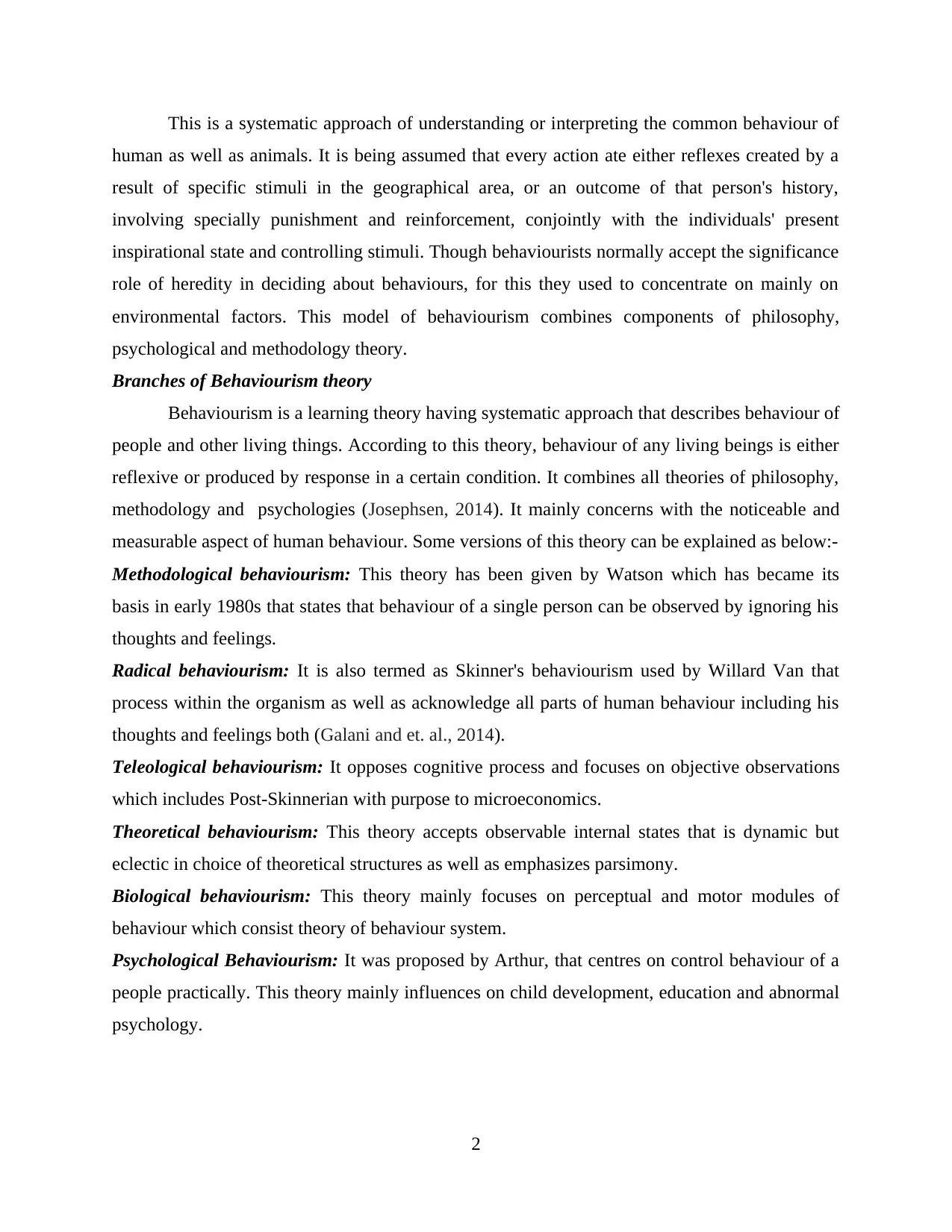
This is a systematic approach of understanding or interpreting the common behaviour of
human as well as animals. It is being assumed that every action ate either reflexes created by a
result of specific stimuli in the geographical area, or an outcome of that person's history,
involving specially punishment and reinforcement, conjointly with the individuals' present
inspirational state and controlling stimuli. Though behaviourists normally accept the significance
role of heredity in deciding about behaviours, for this they used to concentrate on mainly on
environmental factors. This model of behaviourism combines components of philosophy,
psychological and methodology theory.
Branches of Behaviourism theory
Behaviourism is a learning theory having systematic approach that describes behaviour of
people and other living things. According to this theory, behaviour of any living beings is either
reflexive or produced by response in a certain condition. It combines all theories of philosophy,
methodology and psychologies (Josephsen, 2014). It mainly concerns with the noticeable and
measurable aspect of human behaviour. Some versions of this theory can be explained as below:-
Methodological behaviourism: This theory has been given by Watson which has became its
basis in early 1980s that states that behaviour of a single person can be observed by ignoring his
thoughts and feelings.
Radical behaviourism: It is also termed as Skinner's behaviourism used by Willard Van that
process within the organism as well as acknowledge all parts of human behaviour including his
thoughts and feelings both (Galani and et. al., 2014).
Teleological behaviourism: It opposes cognitive process and focuses on objective observations
which includes Post-Skinnerian with purpose to microeconomics.
Theoretical behaviourism: This theory accepts observable internal states that is dynamic but
eclectic in choice of theoretical structures as well as emphasizes parsimony.
Biological behaviourism: This theory mainly focuses on perceptual and motor modules of
behaviour which consist theory of behaviour system.
Psychological Behaviourism: It was proposed by Arthur, that centres on control behaviour of a
people practically. This theory mainly influences on child development, education and abnormal
psychology.
2
human as well as animals. It is being assumed that every action ate either reflexes created by a
result of specific stimuli in the geographical area, or an outcome of that person's history,
involving specially punishment and reinforcement, conjointly with the individuals' present
inspirational state and controlling stimuli. Though behaviourists normally accept the significance
role of heredity in deciding about behaviours, for this they used to concentrate on mainly on
environmental factors. This model of behaviourism combines components of philosophy,
psychological and methodology theory.
Branches of Behaviourism theory
Behaviourism is a learning theory having systematic approach that describes behaviour of
people and other living things. According to this theory, behaviour of any living beings is either
reflexive or produced by response in a certain condition. It combines all theories of philosophy,
methodology and psychologies (Josephsen, 2014). It mainly concerns with the noticeable and
measurable aspect of human behaviour. Some versions of this theory can be explained as below:-
Methodological behaviourism: This theory has been given by Watson which has became its
basis in early 1980s that states that behaviour of a single person can be observed by ignoring his
thoughts and feelings.
Radical behaviourism: It is also termed as Skinner's behaviourism used by Willard Van that
process within the organism as well as acknowledge all parts of human behaviour including his
thoughts and feelings both (Galani and et. al., 2014).
Teleological behaviourism: It opposes cognitive process and focuses on objective observations
which includes Post-Skinnerian with purpose to microeconomics.
Theoretical behaviourism: This theory accepts observable internal states that is dynamic but
eclectic in choice of theoretical structures as well as emphasizes parsimony.
Biological behaviourism: This theory mainly focuses on perceptual and motor modules of
behaviour which consist theory of behaviour system.
Psychological Behaviourism: It was proposed by Arthur, that centres on control behaviour of a
people practically. This theory mainly influences on child development, education and abnormal
psychology.
2
Paraphrase This Document
Need a fresh take? Get an instant paraphrase of this document with our AI Paraphraser
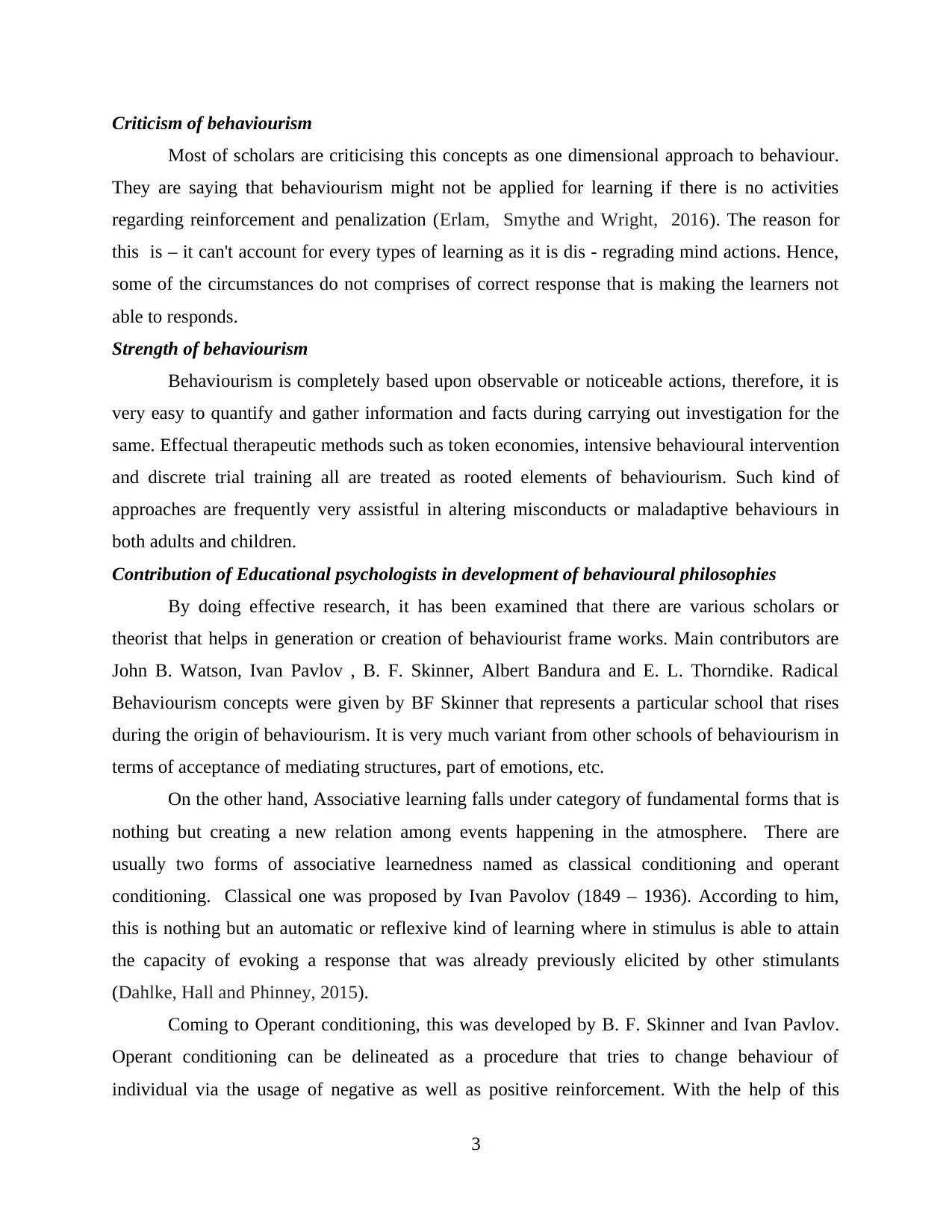
Criticism of behaviourism
Most of scholars are criticising this concepts as one dimensional approach to behaviour.
They are saying that behaviourism might not be applied for learning if there is no activities
regarding reinforcement and penalization (Erlam, Smythe and Wright, 2016). The reason for
this is – it can't account for every types of learning as it is dis - regrading mind actions. Hence,
some of the circumstances do not comprises of correct response that is making the learners not
able to responds.
Strength of behaviourism
Behaviourism is completely based upon observable or noticeable actions, therefore, it is
very easy to quantify and gather information and facts during carrying out investigation for the
same. Effectual therapeutic methods such as token economies, intensive behavioural intervention
and discrete trial training all are treated as rooted elements of behaviourism. Such kind of
approaches are frequently very assistful in altering misconducts or maladaptive behaviours in
both adults and children.
Contribution of Educational psychologists in development of behavioural philosophies
By doing effective research, it has been examined that there are various scholars or
theorist that helps in generation or creation of behaviourist frame works. Main contributors are
John B. Watson, Ivan Pavlov , B. F. Skinner, Albert Bandura and E. L. Thorndike. Radical
Behaviourism concepts were given by BF Skinner that represents a particular school that rises
during the origin of behaviourism. It is very much variant from other schools of behaviourism in
terms of acceptance of mediating structures, part of emotions, etc.
On the other hand, Associative learning falls under category of fundamental forms that is
nothing but creating a new relation among events happening in the atmosphere. There are
usually two forms of associative learnedness named as classical conditioning and operant
conditioning. Classical one was proposed by Ivan Pavolov (1849 – 1936). According to him,
this is nothing but an automatic or reflexive kind of learning where in stimulus is able to attain
the capacity of evoking a response that was already previously elicited by other stimulants
(Dahlke, Hall and Phinney, 2015).
Coming to Operant conditioning, this was developed by B. F. Skinner and Ivan Pavlov.
Operant conditioning can be delineated as a procedure that tries to change behaviour of
individual via the usage of negative as well as positive reinforcement. With the help of this
3
Most of scholars are criticising this concepts as one dimensional approach to behaviour.
They are saying that behaviourism might not be applied for learning if there is no activities
regarding reinforcement and penalization (Erlam, Smythe and Wright, 2016). The reason for
this is – it can't account for every types of learning as it is dis - regrading mind actions. Hence,
some of the circumstances do not comprises of correct response that is making the learners not
able to responds.
Strength of behaviourism
Behaviourism is completely based upon observable or noticeable actions, therefore, it is
very easy to quantify and gather information and facts during carrying out investigation for the
same. Effectual therapeutic methods such as token economies, intensive behavioural intervention
and discrete trial training all are treated as rooted elements of behaviourism. Such kind of
approaches are frequently very assistful in altering misconducts or maladaptive behaviours in
both adults and children.
Contribution of Educational psychologists in development of behavioural philosophies
By doing effective research, it has been examined that there are various scholars or
theorist that helps in generation or creation of behaviourist frame works. Main contributors are
John B. Watson, Ivan Pavlov , B. F. Skinner, Albert Bandura and E. L. Thorndike. Radical
Behaviourism concepts were given by BF Skinner that represents a particular school that rises
during the origin of behaviourism. It is very much variant from other schools of behaviourism in
terms of acceptance of mediating structures, part of emotions, etc.
On the other hand, Associative learning falls under category of fundamental forms that is
nothing but creating a new relation among events happening in the atmosphere. There are
usually two forms of associative learnedness named as classical conditioning and operant
conditioning. Classical one was proposed by Ivan Pavolov (1849 – 1936). According to him,
this is nothing but an automatic or reflexive kind of learning where in stimulus is able to attain
the capacity of evoking a response that was already previously elicited by other stimulants
(Dahlke, Hall and Phinney, 2015).
Coming to Operant conditioning, this was developed by B. F. Skinner and Ivan Pavlov.
Operant conditioning can be delineated as a procedure that tries to change behaviour of
individual via the usage of negative as well as positive reinforcement. With the help of this
3
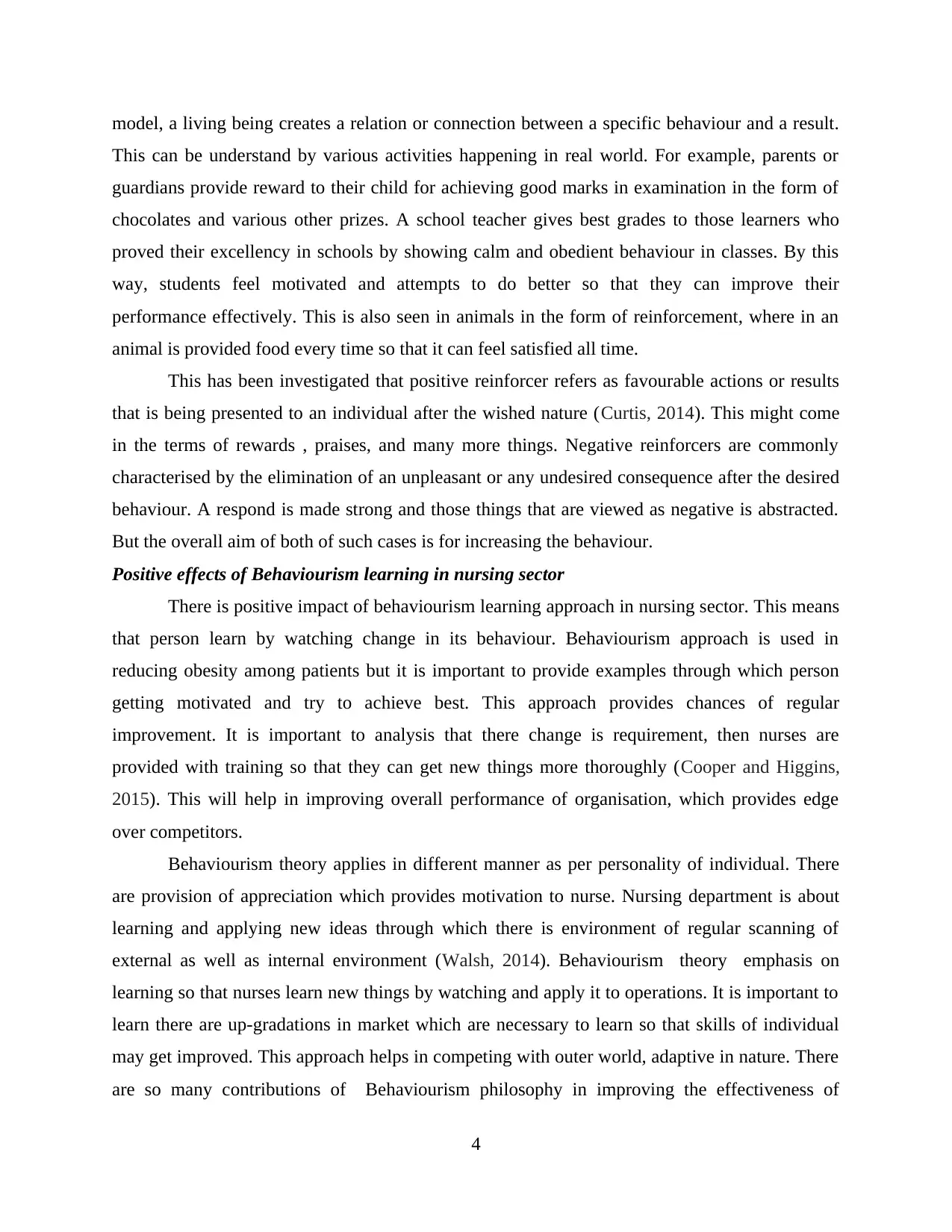
model, a living being creates a relation or connection between a specific behaviour and a result.
This can be understand by various activities happening in real world. For example, parents or
guardians provide reward to their child for achieving good marks in examination in the form of
chocolates and various other prizes. A school teacher gives best grades to those learners who
proved their excellency in schools by showing calm and obedient behaviour in classes. By this
way, students feel motivated and attempts to do better so that they can improve their
performance effectively. This is also seen in animals in the form of reinforcement, where in an
animal is provided food every time so that it can feel satisfied all time.
This has been investigated that positive reinforcer refers as favourable actions or results
that is being presented to an individual after the wished nature (Curtis, 2014). This might come
in the terms of rewards , praises, and many more things. Negative reinforcers are commonly
characterised by the elimination of an unpleasant or any undesired consequence after the desired
behaviour. A respond is made strong and those things that are viewed as negative is abstracted.
But the overall aim of both of such cases is for increasing the behaviour.
Positive effects of Behaviourism learning in nursing sector
There is positive impact of behaviourism learning approach in nursing sector. This means
that person learn by watching change in its behaviour. Behaviourism approach is used in
reducing obesity among patients but it is important to provide examples through which person
getting motivated and try to achieve best. This approach provides chances of regular
improvement. It is important to analysis that there change is requirement, then nurses are
provided with training so that they can get new things more thoroughly (Cooper and Higgins,
2015). This will help in improving overall performance of organisation, which provides edge
over competitors.
Behaviourism theory applies in different manner as per personality of individual. There
are provision of appreciation which provides motivation to nurse. Nursing department is about
learning and applying new ideas through which there is environment of regular scanning of
external as well as internal environment (Walsh, 2014). Behaviourism theory emphasis on
learning so that nurses learn new things by watching and apply it to operations. It is important to
learn there are up-gradations in market which are necessary to learn so that skills of individual
may get improved. This approach helps in competing with outer world, adaptive in nature. There
are so many contributions of Behaviourism philosophy in improving the effectiveness of
4
This can be understand by various activities happening in real world. For example, parents or
guardians provide reward to their child for achieving good marks in examination in the form of
chocolates and various other prizes. A school teacher gives best grades to those learners who
proved their excellency in schools by showing calm and obedient behaviour in classes. By this
way, students feel motivated and attempts to do better so that they can improve their
performance effectively. This is also seen in animals in the form of reinforcement, where in an
animal is provided food every time so that it can feel satisfied all time.
This has been investigated that positive reinforcer refers as favourable actions or results
that is being presented to an individual after the wished nature (Curtis, 2014). This might come
in the terms of rewards , praises, and many more things. Negative reinforcers are commonly
characterised by the elimination of an unpleasant or any undesired consequence after the desired
behaviour. A respond is made strong and those things that are viewed as negative is abstracted.
But the overall aim of both of such cases is for increasing the behaviour.
Positive effects of Behaviourism learning in nursing sector
There is positive impact of behaviourism learning approach in nursing sector. This means
that person learn by watching change in its behaviour. Behaviourism approach is used in
reducing obesity among patients but it is important to provide examples through which person
getting motivated and try to achieve best. This approach provides chances of regular
improvement. It is important to analysis that there change is requirement, then nurses are
provided with training so that they can get new things more thoroughly (Cooper and Higgins,
2015). This will help in improving overall performance of organisation, which provides edge
over competitors.
Behaviourism theory applies in different manner as per personality of individual. There
are provision of appreciation which provides motivation to nurse. Nursing department is about
learning and applying new ideas through which there is environment of regular scanning of
external as well as internal environment (Walsh, 2014). Behaviourism theory emphasis on
learning so that nurses learn new things by watching and apply it to operations. It is important to
learn there are up-gradations in market which are necessary to learn so that skills of individual
may get improved. This approach helps in competing with outer world, adaptive in nature. There
are so many contributions of Behaviourism philosophy in improving the effectiveness of
4
⊘ This is a preview!⊘
Do you want full access?
Subscribe today to unlock all pages.

Trusted by 1+ million students worldwide
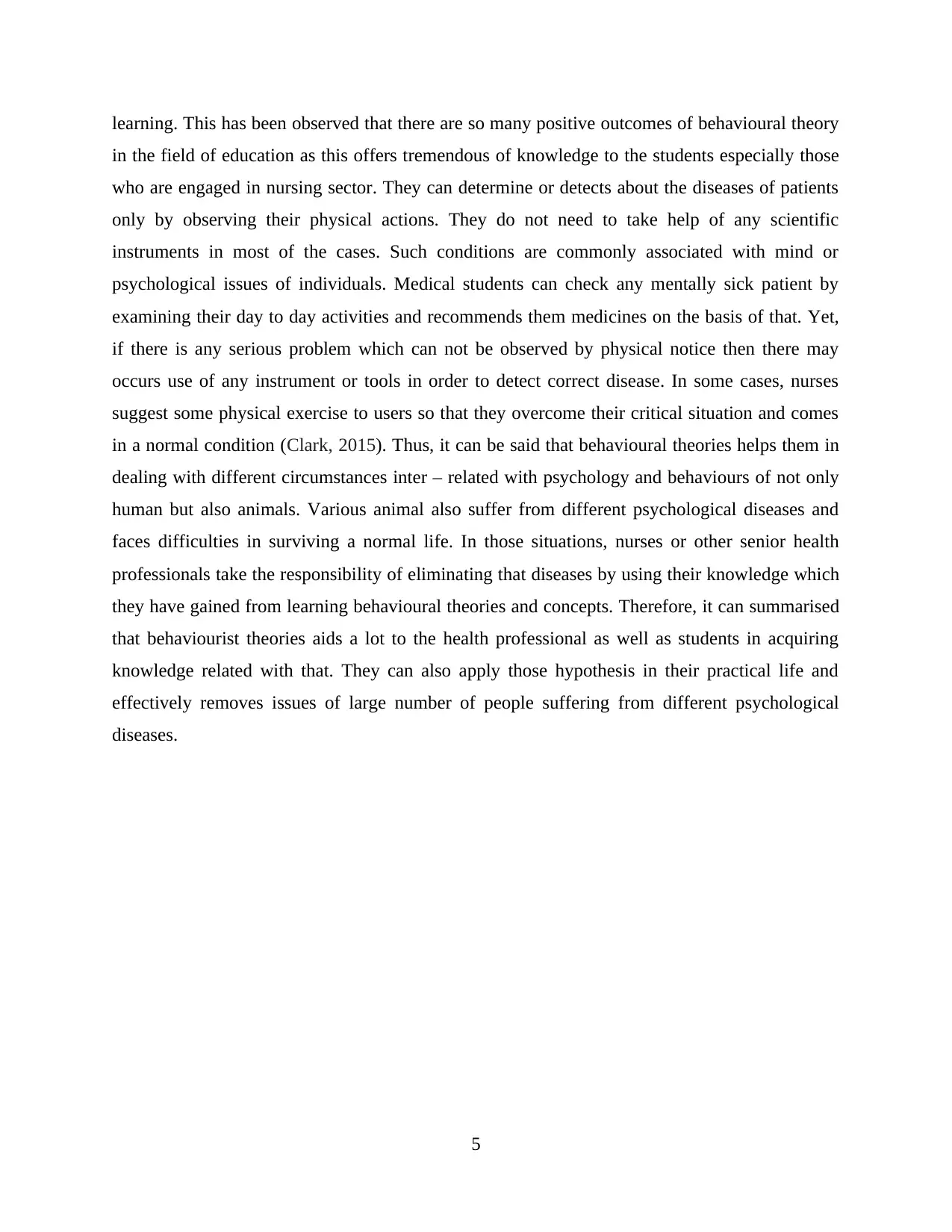
learning. This has been observed that there are so many positive outcomes of behavioural theory
in the field of education as this offers tremendous of knowledge to the students especially those
who are engaged in nursing sector. They can determine or detects about the diseases of patients
only by observing their physical actions. They do not need to take help of any scientific
instruments in most of the cases. Such conditions are commonly associated with mind or
psychological issues of individuals. Medical students can check any mentally sick patient by
examining their day to day activities and recommends them medicines on the basis of that. Yet,
if there is any serious problem which can not be observed by physical notice then there may
occurs use of any instrument or tools in order to detect correct disease. In some cases, nurses
suggest some physical exercise to users so that they overcome their critical situation and comes
in a normal condition (Clark, 2015). Thus, it can be said that behavioural theories helps them in
dealing with different circumstances inter – related with psychology and behaviours of not only
human but also animals. Various animal also suffer from different psychological diseases and
faces difficulties in surviving a normal life. In those situations, nurses or other senior health
professionals take the responsibility of eliminating that diseases by using their knowledge which
they have gained from learning behavioural theories and concepts. Therefore, it can summarised
that behaviourist theories aids a lot to the health professional as well as students in acquiring
knowledge related with that. They can also apply those hypothesis in their practical life and
effectively removes issues of large number of people suffering from different psychological
diseases.
5
in the field of education as this offers tremendous of knowledge to the students especially those
who are engaged in nursing sector. They can determine or detects about the diseases of patients
only by observing their physical actions. They do not need to take help of any scientific
instruments in most of the cases. Such conditions are commonly associated with mind or
psychological issues of individuals. Medical students can check any mentally sick patient by
examining their day to day activities and recommends them medicines on the basis of that. Yet,
if there is any serious problem which can not be observed by physical notice then there may
occurs use of any instrument or tools in order to detect correct disease. In some cases, nurses
suggest some physical exercise to users so that they overcome their critical situation and comes
in a normal condition (Clark, 2015). Thus, it can be said that behavioural theories helps them in
dealing with different circumstances inter – related with psychology and behaviours of not only
human but also animals. Various animal also suffer from different psychological diseases and
faces difficulties in surviving a normal life. In those situations, nurses or other senior health
professionals take the responsibility of eliminating that diseases by using their knowledge which
they have gained from learning behavioural theories and concepts. Therefore, it can summarised
that behaviourist theories aids a lot to the health professional as well as students in acquiring
knowledge related with that. They can also apply those hypothesis in their practical life and
effectively removes issues of large number of people suffering from different psychological
diseases.
5
Paraphrase This Document
Need a fresh take? Get an instant paraphrase of this document with our AI Paraphraser
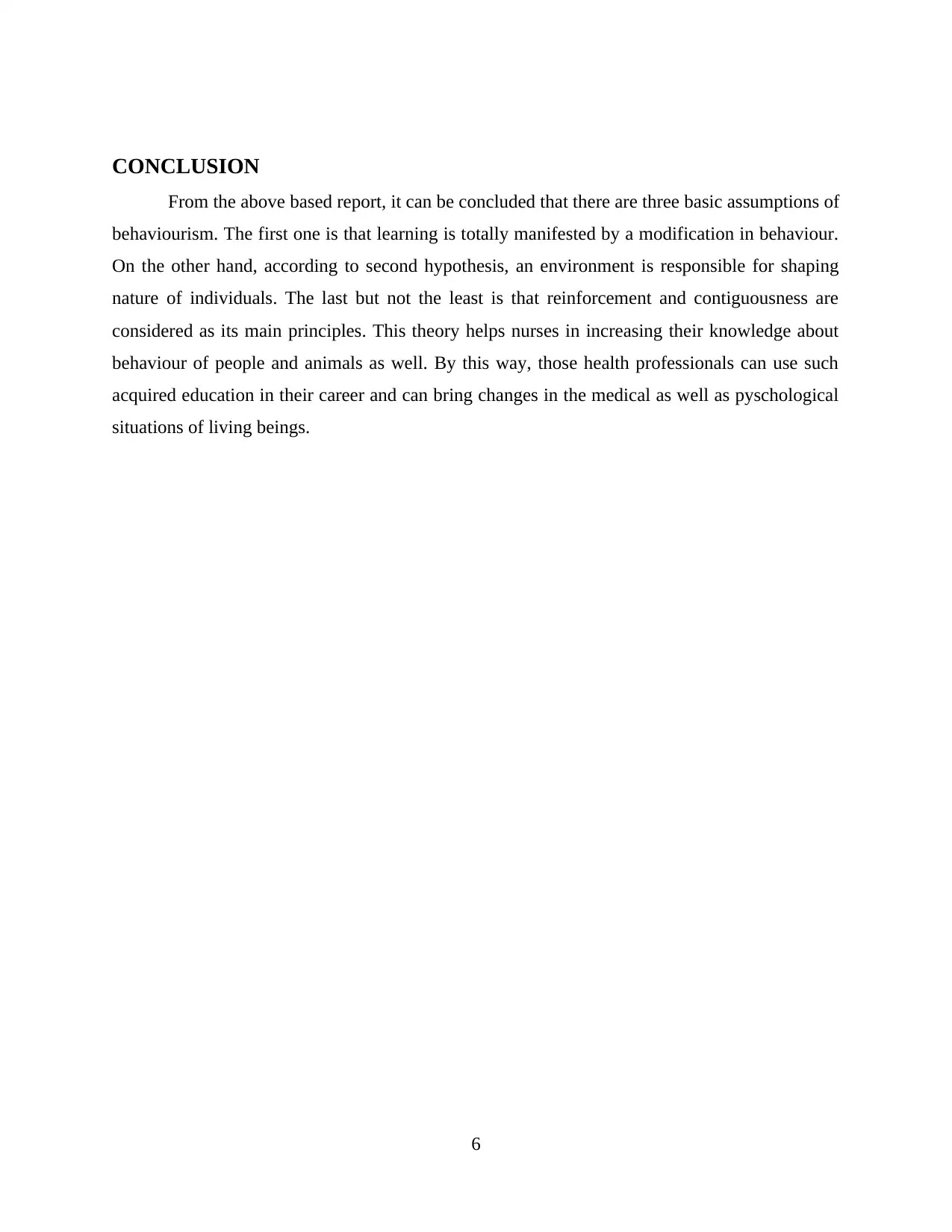
CONCLUSION
From the above based report, it can be concluded that there are three basic assumptions of
behaviourism. The first one is that learning is totally manifested by a modification in behaviour.
On the other hand, according to second hypothesis, an environment is responsible for shaping
nature of individuals. The last but not the least is that reinforcement and contiguousness are
considered as its main principles. This theory helps nurses in increasing their knowledge about
behaviour of people and animals as well. By this way, those health professionals can use such
acquired education in their career and can bring changes in the medical as well as pyschological
situations of living beings.
6
From the above based report, it can be concluded that there are three basic assumptions of
behaviourism. The first one is that learning is totally manifested by a modification in behaviour.
On the other hand, according to second hypothesis, an environment is responsible for shaping
nature of individuals. The last but not the least is that reinforcement and contiguousness are
considered as its main principles. This theory helps nurses in increasing their knowledge about
behaviour of people and animals as well. By this way, those health professionals can use such
acquired education in their career and can bring changes in the medical as well as pyschological
situations of living beings.
6
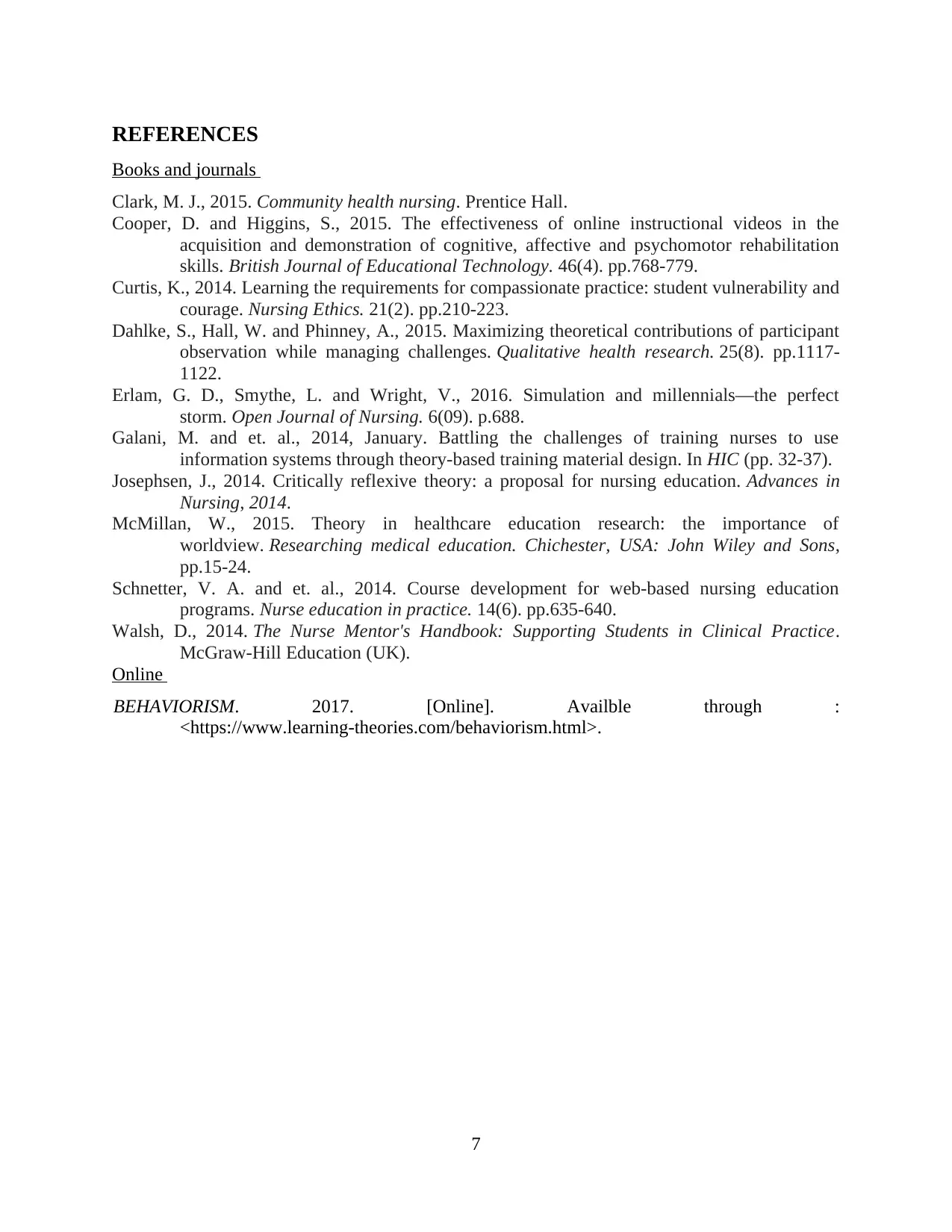
REFERENCES
Books and journals
Clark, M. J., 2015. Community health nursing. Prentice Hall.
Cooper, D. and Higgins, S., 2015. The effectiveness of online instructional videos in the
acquisition and demonstration of cognitive, affective and psychomotor rehabilitation
skills. British Journal of Educational Technology. 46(4). pp.768-779.
Curtis, K., 2014. Learning the requirements for compassionate practice: student vulnerability and
courage. Nursing Ethics. 21(2). pp.210-223.
Dahlke, S., Hall, W. and Phinney, A., 2015. Maximizing theoretical contributions of participant
observation while managing challenges. Qualitative health research. 25(8). pp.1117-
1122.
Erlam, G. D., Smythe, L. and Wright, V., 2016. Simulation and millennials—the perfect
storm. Open Journal of Nursing. 6(09). p.688.
Galani, M. and et. al., 2014, January. Battling the challenges of training nurses to use
information systems through theory-based training material design. In HIC (pp. 32-37).
Josephsen, J., 2014. Critically reflexive theory: a proposal for nursing education. Advances in
Nursing, 2014.
McMillan, W., 2015. Theory in healthcare education research: the importance of
worldview. Researching medical education. Chichester, USA: John Wiley and Sons,
pp.15-24.
Schnetter, V. A. and et. al., 2014. Course development for web-based nursing education
programs. Nurse education in practice. 14(6). pp.635-640.
Walsh, D., 2014. The Nurse Mentor's Handbook: Supporting Students in Clinical Practice.
McGraw-Hill Education (UK).
Online
BEHAVIORISM. 2017. [Online]. Availble through :
<https://www.learning-theories.com/behaviorism.html>.
7
Books and journals
Clark, M. J., 2015. Community health nursing. Prentice Hall.
Cooper, D. and Higgins, S., 2015. The effectiveness of online instructional videos in the
acquisition and demonstration of cognitive, affective and psychomotor rehabilitation
skills. British Journal of Educational Technology. 46(4). pp.768-779.
Curtis, K., 2014. Learning the requirements for compassionate practice: student vulnerability and
courage. Nursing Ethics. 21(2). pp.210-223.
Dahlke, S., Hall, W. and Phinney, A., 2015. Maximizing theoretical contributions of participant
observation while managing challenges. Qualitative health research. 25(8). pp.1117-
1122.
Erlam, G. D., Smythe, L. and Wright, V., 2016. Simulation and millennials—the perfect
storm. Open Journal of Nursing. 6(09). p.688.
Galani, M. and et. al., 2014, January. Battling the challenges of training nurses to use
information systems through theory-based training material design. In HIC (pp. 32-37).
Josephsen, J., 2014. Critically reflexive theory: a proposal for nursing education. Advances in
Nursing, 2014.
McMillan, W., 2015. Theory in healthcare education research: the importance of
worldview. Researching medical education. Chichester, USA: John Wiley and Sons,
pp.15-24.
Schnetter, V. A. and et. al., 2014. Course development for web-based nursing education
programs. Nurse education in practice. 14(6). pp.635-640.
Walsh, D., 2014. The Nurse Mentor's Handbook: Supporting Students in Clinical Practice.
McGraw-Hill Education (UK).
Online
BEHAVIORISM. 2017. [Online]. Availble through :
<https://www.learning-theories.com/behaviorism.html>.
7
⊘ This is a preview!⊘
Do you want full access?
Subscribe today to unlock all pages.

Trusted by 1+ million students worldwide
1 out of 9
Related Documents
Your All-in-One AI-Powered Toolkit for Academic Success.
+13062052269
info@desklib.com
Available 24*7 on WhatsApp / Email
![[object Object]](/_next/static/media/star-bottom.7253800d.svg)
Unlock your academic potential
Copyright © 2020–2026 A2Z Services. All Rights Reserved. Developed and managed by ZUCOL.





